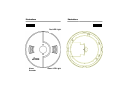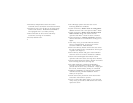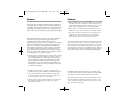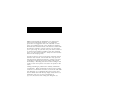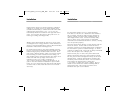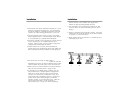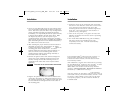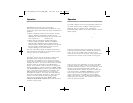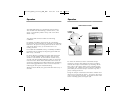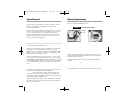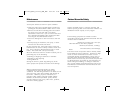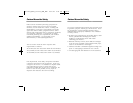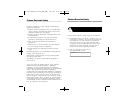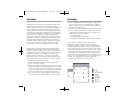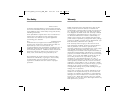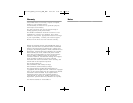
Possible Sources of CO
CO can be produced when burning any fossil fuel, such
as gasoline, propane, natural gas, oil and wood. It can
be produced by any fuel-burning appliance that is
malfunctioning, improperly installed, or not ventilated
c o r rectly, such as:
• Fu rnaces, gas ranges/stoves, gas clothes dryers, water
heaters, portable fuel burning space heaters,
f i rep laces, wood-burning stoves and certain
swimming pool heaters.
• Blocked chimneys or flues, back drafts and changes
in air pre s s u re, corroded or disconnected vent pipes,
loose or cracked furnace exchangers.
• Vehicles and other combustion engines running in an
open or closed garage, attached or near a home.
• C h a rco al/gas grills and hibachis in an enclosed are a .
Carbon Monoxide Safety
Carbon Monoxide Safety
24 25
Initial carbon monoxide poisoning symptoms are
similar to the flu with no fever and can include
dizziness, severe headaches, nausea, vomiting and
disorientation. Everyone is susceptible, but experts
agree that unborn babies, pregnant women, senior
citizens and people with heart or respiratory problems
are especially vulnerable. If symptoms of carbon
monoxide poisoning are experienced, seek medical
attention immediately. CO poisoning can be
determined by a carboxyhemoglobin test.
CO Sensor Response Times
The CO sensor meets the alarm response time
requirements as follows:
At 70 PPM, the unit must alarm within 60-240 minutes.
At 150 PPM, the unit must alarm within 10-50 minutes.
At 400 PPM, the unit must alarm within 4-15 minutes.
NOTE: This carbon monoxide alarm is designed to
detect carbon monoxide gas from ANY source of
combustion. It is NOT designed to detect any other
gasses.
Fire departments, most utility companies and HVAC
contractors will perform CO inspections. Some may
charge for this service. It’s advisable to inquire about
any applicable fees prior to having the service
performed. Kidde will not pay for, or reimburse, the
owner or user of this product, for any repair or
dispatch calls related to the alarm sounding.
810-1692_RevD_119-133_MAN_ENG 10/7/03 4:41 PM Page 24



